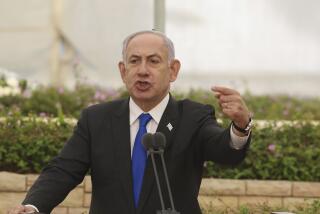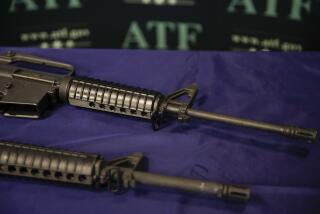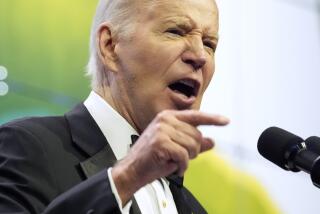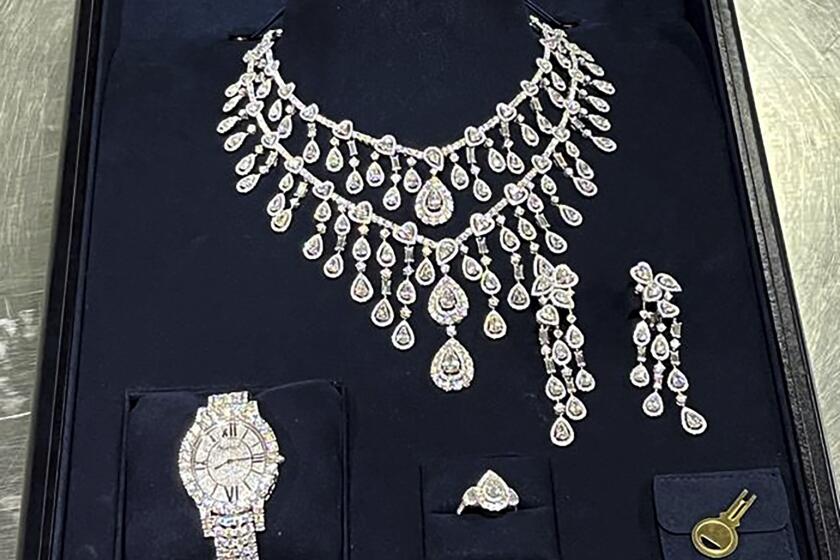Despite Ban, U.S. Arms Are Sold to Pakistan
Despite a ban on military sales to Pakistan by the U.S. government, the Bush Administration has quietly permitted the Pakistani armed forces to buy American-made arms from commercial firms for the last year and a half, according to classified documents and Administration officials.
Among the military items licensed for sale to Pakistan are spare parts for American-made F-16 fighter planes, which form the nucleus of Islamabad’s air force, Administration officials confirmed. The volume of sales could not be determined. But officials said the equipment is intended to help Pakistan maintain its current arsenal.
The Administration permitted the sales despite a 1985 federal law, which says that “no military equipment or technology shall be sold or transferred to Pakistan” unless the President certifies to Congress that “Pakistan does not possess a nuclear explosive device.”
The ban is part of an effort by Congress to curb the spread of nuclear weapons and to punish nations that actively support such development programs. Pakistan, which has admitted possessing the capability to build a nuclear bomb, is one of a handful of countries that has refused to sign the international Nuclear Non-Proliferation Treaty.
In Senate testimony in January, CIA Director Robert M. Gates described Pakistan’s nuclear weapons program and its arms race with India as serious threats to peace and security in the region. Gates acknowledged that intelligence reports have indicated Pakistan is trying to equip its American-supplied F-16 fighters to deliver nuclear weapons.
In October, 1990, the Administration was unable to certify Pakistan’s compliance with the law, and the arms ban passed by Congress took effect, freezing $570 million in U.S. military aid. Although the Administration cut off direct country-to-country arms sales at the time, it decided to allow continued private, commercial arms sales to Pakistan, according to documents and interviews.
The sales illustrate how the Administration has used private-sector transactions, looser regulations governing “dual-use” equipment and other methods to get sensitive technology to nations supposedly on embargo lists. Before the Persian Gulf War fractured U.S.-Iraqi relations, Iraq obtained an assortment of valuable U.S. defense equipment through private transactions and export loopholes.
Key members of Congress said they did not learn of the commercial sales to Pakistan until last month. Some said that they believe the sales violate the law.
The first public acknowledgment of the policy came Feb. 5 when Secretary of State James A. Baker III described it to the Foreign Relations Committee in response to a question from Sen. Larry Pressler (R-S.D.). Pressler sponsored the restrictive amendment in 1985 and said that he had heard rumors of commercial arms sales to Pakistan.
“We have carefully reviewed the amendment, we’ve reviewed the legislative history and as a legal matter, we do not believe it applies to commercial sales or exports controlled by the Department of Commerce,” Baker testified. “And so we look at munitions and spare parts that are necessary to maintain the Pakistani military at current levels on a case-by-case basis. Commercial sales are limited, and in our view none are being approved that would contravene either the letter or spirit of the law.”
Taking issue with Baker, Pressler said: “Now the amendment . . . did include the language ‘no military equipment or technology shall be sold or transferred to Pakistan.’ . . . That’s fairly hard to argue with.”
Baker responded that State Department lawyers concluded that the law does not restrict commercial arms sales to Pakistan.
Several members of Congress who were involved in the fight for passage of the Pressler amendment in August, 1985, as well as others who sit on committees that oversee U.S. foreign policy in South Asia, said they believe that the Administration policy may violate the law. They also said that the sales were kept secret from them until recently.
Sen. John Glenn (D-Ohio), chairman of the Senate Government Affairs Committee, said in an interview that he considers the Administration’s actions to be potential violations. He also said he was unaware that the sales had been allowed since October, 1990, until told of them by a reporter.
“Their efforts to bypass and thwart the law of the land are now very clear,” said Glenn. “They knew what the intent of the law was. The legislative history is very clear. And it should be their intent or purpose to abide by what we all knew was the intent of the law. It (the 1985 amendment) was signed by the President into law. And then his Administration took steps to not comply with it.”
Peter Galbraith, a senior staff member of the Senate Foreign Relations Committee, said the Administration’s policy “is a direct violation of both the spirit and letter of the law. . . .The law is very clear. It prohibits all arms transactions of any type to Pakistan unless the President certifies Pakistan does not possess a nuclear weapon.”
An Administration official said the decision to allow commercial military sales to Pakistan was first made Oct. 1, 1990, when the President refused to certify that Pakistan was not trying to develop an atomic weapon. Several members of Congress said that, when Baker revealed the policy last month, they thought it had been implemented only recently and did not suspect that the commercial sales had been permitted for nearly 18 months.
An Administration official said Pakistan is allowed to buy spare parts and other items on a munitions list to maintain its military. A classified document describing the policy sets out similar guidelines. The official, who asked that his name be withheld, said that a ban on all sales would have severely damaged U.S.-Pakistani relations.
Leonard Spector, senior associate of the Carnegie Endowment for International Peace, said that an outright ban would have put severe pressure on the Pakistanis, posing the prospect of their “losing their ability to fly their F-16s from want of spare parts. Clearly the Bush Administration did not see the need to continue that type of pressure.”
According to the Administration official, selected members of congressional staffs were told about the private sales on an informal basis, if they inquired. The official declined to name the staffers who were told of the policy, saying he wanted to protect their privacy.
On Feb. 7, two days after Baker’s Senate testimony, Pakistani Foreign Secretary Shahryar Khan acknowledged publicly for the first time that his country had the capacity to build an atomic bomb. Khan told a gathering at the United Nations: “There was a capability in 1989 when the present government came to power and that means we could have moved forward in an unwise position. But we didn’t. Instead we froze the program.”
Despite its ability to do so, Khan asserted that Pakistan would not take the final steps to build or deploy nuclear weapons. He said that the freeze is part of an effort to obtain new American aid and also to lead Congress to do away with the Pressler amendment restrictions.
During the same trip, Khan also stressed that his government would not “reverse” its nuclear capability unless the United States obtains commitments from India to do the same. The two nations have fought three wars since they gained independence in 1947 and occasionally exchange artillery fire.
Although it was widely known for years that Pakistan was engaging in a massive, covert effort to build atomic weapons, the Reagan and Bush administrations were reluctant to take strict measures against Pakistan because of its assistance to U.S. efforts to arm the Afghan rebels, who were fighting Soviet troops in Afghanistan.
Justification for the leniency began to dissolve after Soviet troops withdrew from Afghanistan in 1989.
Waas is a special correspondent and Frantz is a Times staff writer.
More to Read
Start your day right
Sign up for Essential California for news, features and recommendations from the L.A. Times and beyond in your inbox six days a week.
You may occasionally receive promotional content from the Los Angeles Times.






